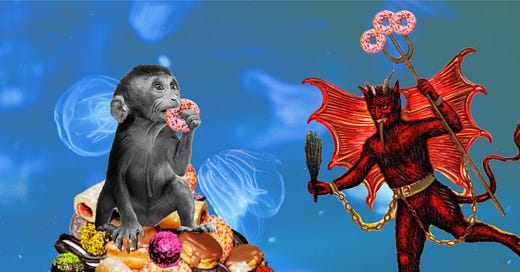Hi,
I briefly talked about hedonism last time: hedonism is the ethical theory that pleasure (in the sense of the satisfaction of desires) is the highest good and aim of human life.
In the context of sustainability and regeneration, hedonism is sometimes considered to be the devil in disguise.
I think hedonism, the search for more pleasure, has a bad rep.
Nowadays, we are prompted to renounce hedonism, those worldly pleasures like consumerism and indulgences. But hedonism can be something other than indulgence. It can point to the sweet taste of existence, incorporating the most complex sensations. It can situate us in relation to what we take pleasure in - ourselves, other humans and nonhumans, and the environment.
A humanity that no longer takes pleasure in the other also no longer sees the harm it causes the other. It has no sense for the uglification of the world; it is ambivalent to the destruction of ecosystems; it exploits what is to exploit.
The way out of the hamster wheel is not to deny pleasure but to fully embrace it.
Hedonism, though is not the absence of limits to our desires. It’s not eating a gallon or litre of ice cream. Instead, it is the trust and confidence in our desires. When we lose this trust, we deny what it means to be human. We can reject desire, and we can fulfill desire. When we fulfill it, it brings us in relation with the world because it stimulates our senses. And only through our senses do we come into existence.
The problem, then is not hedonism.
Instead, it’s the misdirected desires. For example, when we meet our desire for intimacy with said ice cream.
Hedonism can help us overcome the void by reconnecting to the real and underlying desires that stimulate our senses.
Till next time,
Jes




